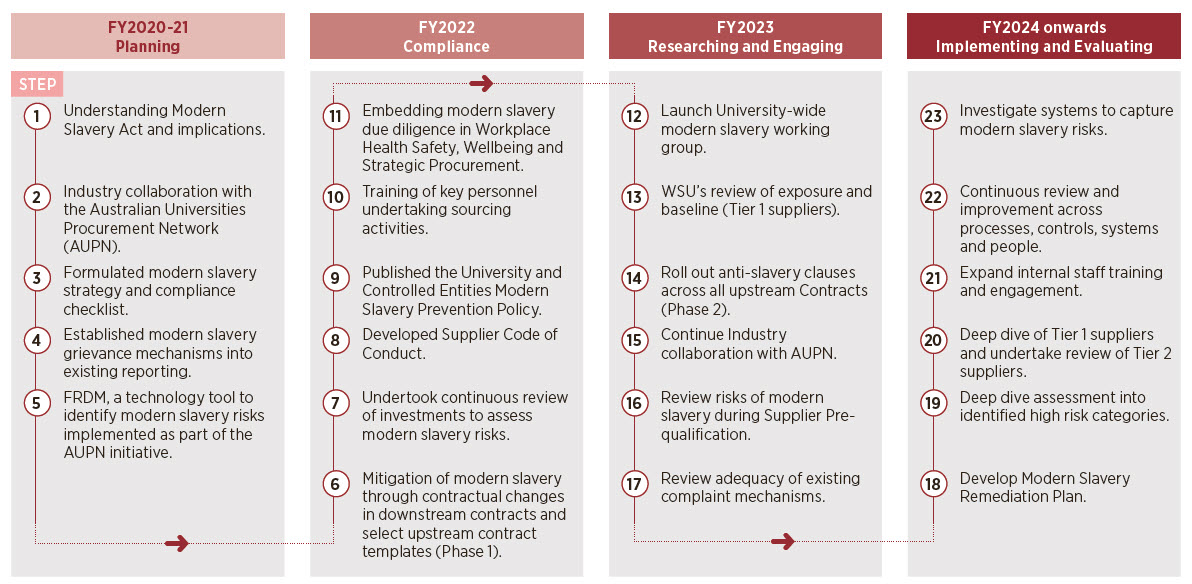- The University's Financial Framework
- University Insurances
- How to pay your University bills from anywhere
- Finance Forms
- Financial Services
- Finance Processes and Procedures
- Finance Business Partnerships
- Information Technology and Digital Services
- Travel and Expense Management System (TEMS)
- Procurement Services
- Treasury
- Supplier Terms & Conditions
Modern Slavery
What is Modern Slavery?
Modern Slavery is the exploitation of individuals through force, fraud, or coercion for various purposes, including forced labour, human trafficking, debt bondage, forced marriage, slavery, deceptive recruitment practices, and the worst forms of child labour. It is a severe violation of human rights and a significant global issue affecting millions of people.
It is estimated that 50 million people are affected by Modern Slavery globally, with industries such as agriculture, fashion, construction and technology, as some of the worst offenders, with supply chains that are heavily embroiled in slavery and forced labour.
Our Commitment
As a leading educational institution deeply embedded in the Greater Western Sydney region, and with international campuses, we recognise and respect the dignity, wellbeing and human rights of the diverse group of students, employees, workers in our supply chains, and the communities within which the University operates, or sources products and services.
Our efforts to combat Modern Slavery are based on the fundamental principle of respect for the dignity of every human life. We are committed to improving the well-being and security of all individuals and have zero tolerance for practices and standards that compromise or exploit the basic human rights of integrity, safety and advancement.
What is Western Sydney University doing?
Western Sydney University’s Decadal Strategy, Sustainability and Resilience 2030, was developed to support the 17 Sustainable Development Goals (SDGs) adopted by the United Nations and recognises our contribution and impact in a wider global context. The initiatives and actions we implement to continually identify, assess and address risks of modern slavery in our operations and supply chains are based on our guiding principles, and reflect our commitment to supporting the UN’s SDGs, specifically SDG 8.7 which calls for the end of trafficking and modern slavery.
Our 2022 Modern Slavery Statement further details the actions that the University has undertaken to mitigate risks of Modern Slavery in both our supply chains and operations, with our focus in 2022 being to establish a strong foundation of practice based on relevant policies and frameworks that assess and respond to Modern Slavery in a meaningful way, whilst building knowledge across the University.
Key initiatives include:
- Continuous assessment of modern slavery risks within our supply chain
- Building awareness across the organisation and student community in identifying Modern Slavery
- Partnering across the Higher Education sector to collaboratively prevent, mitigate and remediate instances of Modern Slavery
Modern Slavery Roadmap
Our Modern Slavery roadmap was established with a focus on prioritising continual improvement and risk management. We believe that the actions imbedded in this roadmap will enable us to steadily improve transparency within our operations and supply chain. 
Click to download image.
Modern Slavery Working Group
In alignment with our road map actions for FY2023, the University established a Modern Slavery working group, connecting key stakeholders and student representatives from across the University with the primary focus and duty of informing and guiding the University’s Senior Executive Leadership Team on Modern Slavery issues, and the University’s responsibilities in addressing and mitigating risks of Modern Slavery.
What do I do if I am made aware of any instances of Modern Slavery?
Students and employees can report concerns or instances of Modern Slavery under the Whistleblowing (Reporting Corruption and Other Wrongdoing) Policy. All reports, and any associated investigations, will be treated as confidential as set out in that policy.
Related Links
Mobile options:

